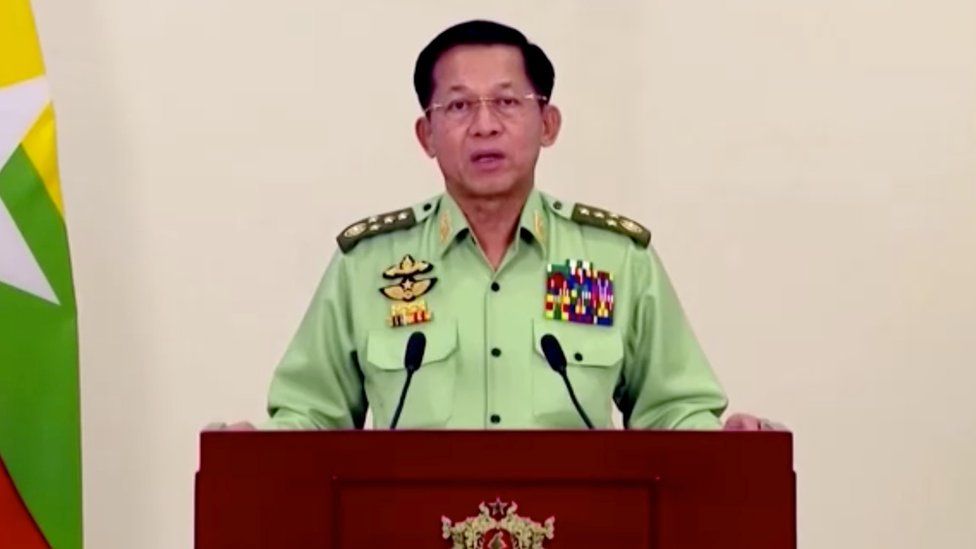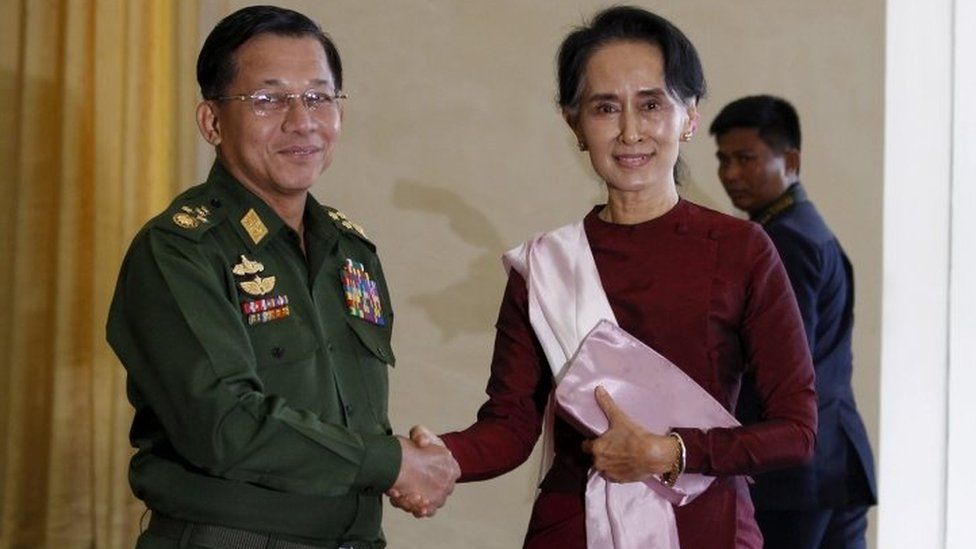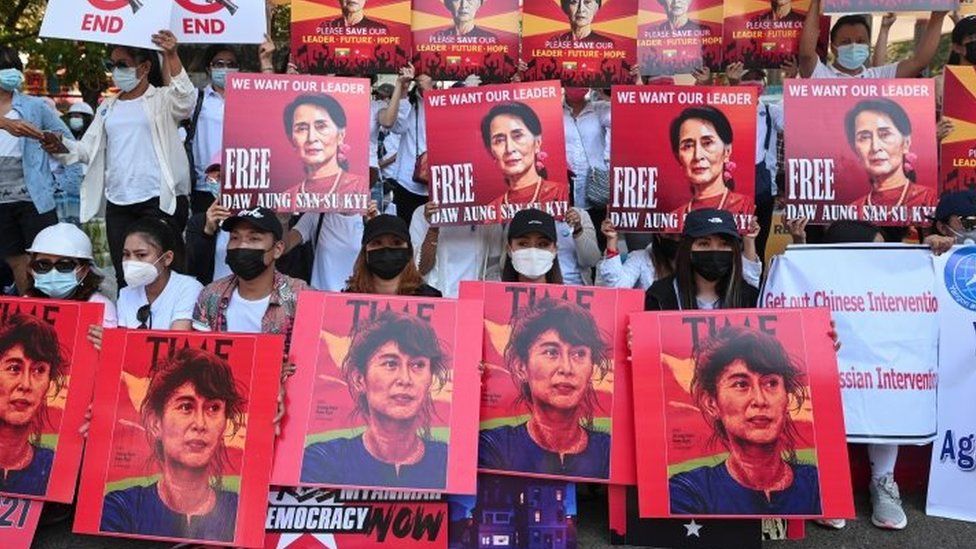
The man who stunned the world by bringing Myanmar's democratic experiment crashing down has made just two public appearances on state television to explain himself.
Looking nervous in front of the teleprompter, General Min Aung Hlaing made no mention of his coup, the detention of the country's elected leaders, the mass demonstrations against military rule in all corners of Myanmar and from all walks of life, the storm of international condemnation and the threat of renewed sanctions.
Instead he repeated tired old military slogans about the need for discipline and unity, and his still unsubstantiated allegations of electoral irregularities in last November's poll. Aside from his evident uneasiness in the unfamiliar role of trying to assuage a furious public, Min Aung Hlaing betrayed no awareness of the dangerous crisis into which he has dragged his country by seizing power.
From the point of view of the rest of the world, and the millions of Burmese who turned out in unexpectedly large numbers to vote resoundingly for a second term of office for Aung San Suu Kyi and her National League for Democracy last November, the coup is a brazen power-grab by a military which has failed spectacularly at the ballot box, and by a commander whose career after mandatory retirement in July this year looked a lot less promising after that result.
But the generals themselves do not see it that way. They spent years shaping the current constitution to preserve the dominant role of the armed forces after a transition to what they still call a "discipline-flourishing democracy". They always reserved for themselves the right to step in if the project was heading in a direction they did not like.
"Every time I met Min Aung Hlaing, he kept insisting the military's job is to protect democracy," one senior diplomat, who lived in Myanmar for several years, told the BBC. They spoke on condition of remaining anonymous.
"From their point of view, the armed forces had to step in because there were irregularities in the country's democracy. That is their justification. They believe they have acted according to the constitution. I think they believe the rest of the world will understand that. They do not think what they have done was a coup."

More on the Myanmar coup:

The 2008 constitution, drafted during the last period of military rule by an assembly of hand-picked delegates, created a hybrid democracy, in which the Tatmadaw, as the armed forces are known, retained a guaranteed one quarter of the seats in the lower and upper houses of parliament, had continued control of the three most powerful ministries, no matter what government was in power, and controlled much of the provincial administration.
The charter also barred anyone with a non-Burmese spouse or children from the presidency, excluding Aung San Suu Kyi from the top job.
I remember asking the Minister of Information at the start of the drafting process in late 2006 what examples Myanmar intended to follow in its path to democracy, and he told me, quite sincerely, that they saw Suharto's authoritarian regime in Indonesia as the most appropriate model.
So when the generals began their democratic opening at the end of 2010 with the release of Aung San Suu Kyi, they expected to retain the whip hand. They expected their proxy party, the USDP, to do well enough in the 2015 election to be able, in combination with the unelected military MPs, to prevent the NLD from forming a single party government, and were shocked by the scale of their defeat.

Last year they fully expected a better result, after five years of sometimes disappointing NLD administration, only to see their share of the seats whittled down even further, to less than seven percent. It is quite possible Min Aung Hlaing genuinely believes his allegations of substantial fraud as the only possible explanation for his party's dismal performance.
Now that the armed forces have seized power, in the name of protecting their version of democracy, what will their next step be?
Dealing with what is turning into a national resistance movement against the coup is their immediate challenge. On everyone's minds in Myanmar is whether they can do this without killing large numbers of protesters, as they have in the past.
But the junta needs a path back to political legitimacy. It has given itself a one-year state of emergency to fix the problem of the NLD's persistent popularity at the ballot box, although that could be extended.
The Thai model?
There is an obvious playbook for the Burmese generals to follow, in neighbouring Thailand.
There, the coup-makers in 2014 also grappled with the problem of how to stop a popular party, in this case Pheu Thai, the party led by Thaksin Shinawatra and his sister Yingluck, which had won every election held since 2001.
Aside from drafting a new constitution with an appointed 250-seat senate as a counterweight to an elected government, the junta in Thailand carefully redesigned the electoral system, to ensure Pheu Thai would win fewer seats. The junta in Myanmar is likely to do the same. The NLD's widespread popularity gives it a much higher proportion of seats than its share of the vote in the existing first-past-the-post system.

The Thai junta also appointed members of the election commission, and greatly influenced membership of the constitutional court. Both those institutions have played a crucial role in ensuring the election rules were interpreted in a way that favoured the military's proxy party, and that court verdicts are always unfavourable to parties opposed to the military's role in politics.
The military in Myanmar has already filed laughably trivial criminal charges against Aung San Suu Kyi and the elected president, Win Myint, who is also from the NLD. It is likely that the nightly raids on the NLD headquarters and on election commission offices around the country are in pursuit of documents which could help the military build a more plausible electoral fraud case against the NLD, with the aim of having it or its top leaders disqualified from a future election.
But in Thailand the country was genuinely divided, with large parts of the population hostile to Thaksin Shinawatra. The military-aligned PPRP actually won more votes than any other party, though fewer seats, and with the help of the election commission was able to scrape together a ruling coalition.
US and others 'lack leverage'
In Myanmar the extraordinary levels of public anger against the coup suggest that in any election which is even close to free and fair the USDP, or whatever party is backed by the Tatmadaw, may do even worse than last November.
The amount of electoral manipulation and repression required to engineer any election in the near future which the military party can win risks leaving any government formed after such an exercise with threadbare legitimacy. The alternative is many more years of military rule, the generals hoping that age and exclusion from power remove Aung San Suu Kyi, who is 75 years old, and the NLD, from the scene.
These are very grim prospects for Myanmar after the huge improvements experienced in the past 10 years.
"I know it's hard to believe, but the armed forces really think they are working towards a multi-party democratic system," said the senior diplomat. "They must be told that if they take these actions, they will not get the understanding of the rest of the world. They will not get the kind of investment and co-operation that came their way in the last decade. This must be expressed to the armed forces in a manner that invites no misunderstanding."
Joe Biden's administration in Washington has already announced new sanctions, targeting, it says, the military and its extensive business interests - but their influence on the Tatmadaw will be limited.

"We don't have a whole lot of leverage," says Derek Mitchell, who was the first US ambassador in Myanmar after the political opening. "The key is our allies. That's a very difficult path, because some of our allies - Japan, India, Korea - have a lot of investment. They will be worried about growing Chinese influence there. We have to find a way to work with allies to apply real and consistent pressure, and not accept this.
"But we don't want to go back to the old-style sanctions. The sanctions need to be very carefully crafted to go after money, weapons, prestige - all the things the military values. The thing they fear most is the country's overdependence on a large neighbour, like China. We have to demonstrate that there is a cost, that if you want balance in your relationships, you're not going to get it this way. The military must understand this."
Will they? Myanmar's economy has already been hit hard by the Covid-19 pandemic, and foreign investment was knocked back after the ethnic cleansing of Rohingyas by the Tatmadaw in 2017. Sanctions may have a limited impact, but foreign companies may pull out anyway to avoid the reputational damage of operating under such an unpopular military regime.
And local businesses warn that attempts by the junta to close down internet access, in an attempt to block the organisation of protests, could cause serious damage to an economy in which small companies now make extensive use of Facebook, in particular, to sell their products. Severe economic distress might persuade the generals to think again.
But having destroyed the power-sharing arrangement which allowed the transition of the past 10 years to happen, it is not clear how they could walk back from the coup, even if they were willing to. Aung San Suu Kyi, who held out against the generals for 20 years while under house arrest, is hardly likely to make concessions to them now they have deposed her in this fashion. Releasing her would only inspire even greater public resistance to the coup. Most likely Min Aung Hlaing will plough on, adding his own dismal chapter to the long tragedy of military misrule in Myanmar.
"What" - Google News
February 13, 2021 at 07:42PM
https://ift.tt/3qejYrI
Myanmar coup: What will the military do now? - BBC News
"What" - Google News
https://ift.tt/3aVokM1
https://ift.tt/2Wij67R
Bagikan Berita Ini














0 Response to "Myanmar coup: What will the military do now? - BBC News"
Post a Comment